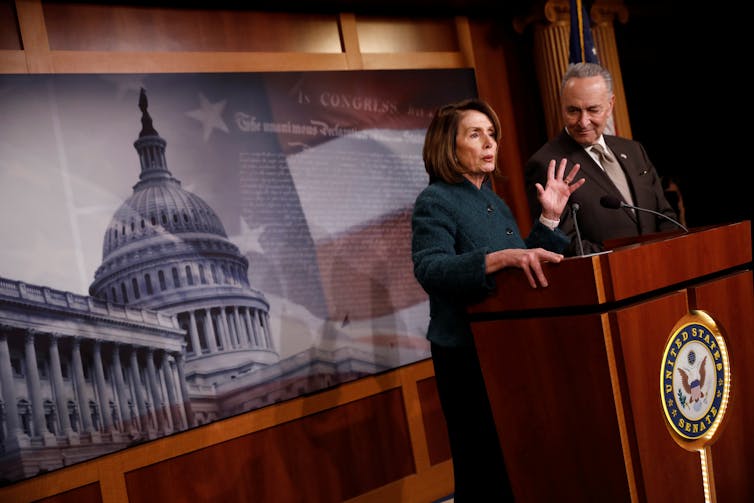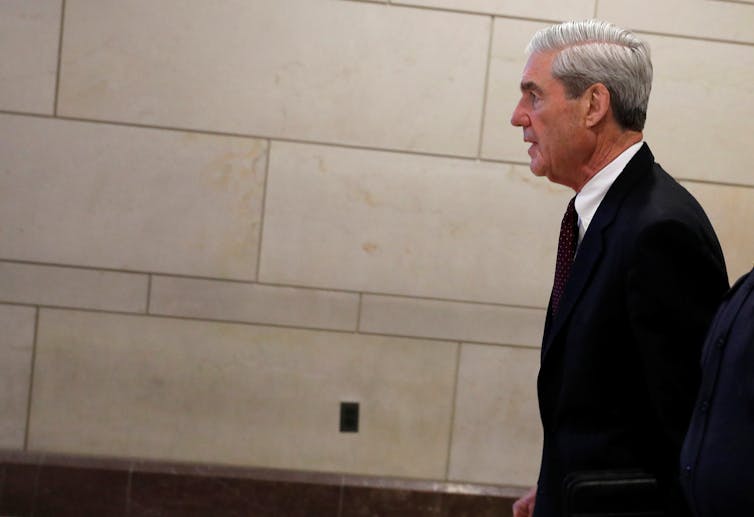Attorney General William Barr’s letter to Congress, delivered Sunday, purports to brief lawmakers about the Mueller report.
What it really does is set the stage for a battle royale with Trump and Barr doing everything in their power to keep secret the full report and, equally important, the materials underlying the report. They’re likely to fight Democrats in Congress, if not both parties, over the materials’ release. And while they’ll probably cite a range of reasons for their objections to revealing the report, they also share an expansive view of a president’s right to keep his discussions secret.
The public and Congress are unable to judge whether Barr’s conclusions are justified because Barr’s letter is mostly silent about the underlying Mueller report conclusions and evidence. This would be remedied in time if Barr were required to provide the full report and its supporting witness and documentary evidence.
But Trump and Barr each have tools to minimize the access of House investigations to the report and evidence. Despite the end of Mueller’s probe, those investigations continue: Democrat Jerrold Nadler, chairman of the House Judiciary Committee, made it clear on Sunday that he plans to “move forward” with his committee’s investigations, “into obstruction of justice, abuses of power, corruption, to defend the rule of law, which is our job.”
The key grounds for Barr and Trump to justify withholding of evidence are grand jury secrecy and executive privilege.

It’s been done before
To be sure, these grounds for withholding, properly and narrowly applied, have support in precedent.
But I believe that Trump and Barr can be counted on to use every means available to overstate and exaggerate the degree to which these doctrines justify withholding this information from justifiable, duly-authorized House investigations.
I was special deputy chief counsel of the House Iran-contra Investigation and acting general counsel of the House of Representatives working with many major House investigations. I saw the tricks the executive branch can pull to withhold evidence.
And I saw the potential for the extreme extent that Trump and Barr could go to keep important materials secret.
Mueller’s investigation included presenting evidence to a grand jury. So let us start with the rule that attorneys, jurors and others “must not disclose a matter occurring before the grand jury” – a rule that could be used to keep much of the Mueller report secret.
In its precise form, this covers “proceedings” of the grand jury. These “proceedings” are occasions when the jurors themselves meet and hear evidence in an investigation. Typically, in investigations of a president or those around him, “proceedings” encompass only a small fraction of the overall body of witnesses and documents.
Voluntary witnesses can be interviewed by the FBI and prosecutors, without the unnecessary trappings of the grand jury. Such witnesses need only attend “proceedings” to the very limited extent that the jurors themselves need to hear them in person to vote an indictment.
Similarly, the documents accumulated in an investigation are only to a very limited extent brought to the grand jurors themselves, as needed for indictment. Over 90 percent of the time, interview memos by the FBI and prosecutors, not grand jury transcripts and specific grand jury exhibits, record the witness and documentary information.
Defining a ‘proceeding’
But Barr can be expected to wield the much-deprecated “Midas touch” doctrine.
Like King Midas’ touch that turned everything into gold, the “Midas touch” doctrine turns everything indirectly and remotely having some attenuated whiff of a grand jury into walled-up “proceedings” of the grand jury.
For example, take the former national security adviser, Michael Flynn, who cooperated with Mueller’s investigation.
Mueller surely has full FBI and prosecutors’ materials and interviews regarding what Flynn said about Trump’s opposition to sanctions for Russia. Yet Barr’s letter says nothing of this, even though the actual Mueller report may include a full accounting of it.

Here’s what could then happen if Flynn even once spoke to a grand jury: Using the “Midas touch” doctrine, Barr – if he provides a version of the Mueller report to the public – could keep all of the evidence secret that Flynn provided to law enforcement.
And the public would not even know if this material was expunged.
What Trump can do
Executive privilege is the principle that the president can withhold specific kinds of information from the courts, Congress or others. It similarly provides a potent tool for Trump to withhold much of the Mueller report.
Executive privilege cannot be used to shield evidence of crime. Since Barr wrote in his letter that Mueller would not exonerate Trump for obstruction of justice, which is a crime, I believe executive privilege should not be used to shield Trump’s communications that relate to obstruction.
In its narrow form, executive privilege only applies to communications with the president and those who serve him as advisers.
So even if Trump has left an evidentiary trail a mile wide showing his intent to snuff out the Mueller inquiry, I expect Trump will claim that is all behind a wall of executive privilege.
And, in the broadest interpretation, executive privilege could supposedly stretch far beyond the president’s own communications, down to lowly assistants and factotums who know about “pre-decisional deliberations” at any level, high or low.
In this interpretation, if there are intelligence agency deputies who contributed to the conclusion, contrary to the president, of the Russian threat, those deputies and their reports are all “pre-decisional deliberations” shielded by executive privilege.
Will the House of Representatives fight against Trump and Barr’s claims of privilege?
Of course. The Framers called the House the “Grand Inquest” of the nation for a reason.
Author: Professor of law, University of Baltimore
Credit link:https://theconversation.com/how-trump-and-barr-could-stretch-claims-of-executive-privilege-and-grand-jury-secrecy-114166<iframe src="https://counter.theconversation.com/content/114166/count.gif?distributor=republish-lightbox-advanced" width="1" height="1"></iframe>


